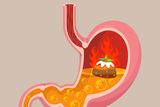Is intermittent fasting just another form of disordered eating?
The latest diet fad to pick up steam involves periods of prolonged abstinence from food. Men in particular are becoming loyal followers of the trend, and it’s why Oliver Keens suspects more people aren’t approaching it with necessary cynicism
Intermittent fasting may have some benefits, but it's too soon to draw conclusions
What if, and I’m just floating it here, intermittent fasting turns out to be… a fad? Something on a par with the long-forgotten “baby food diet” of the early 2010s, let’s say. In the current clamour to acclaim fasting as a way to treat cancer, boost brain power, repair cells and shred fat, I feel like it’s worth recalling the faddy food regiment rumoured to have been taken up by Lady Gaga, Cheryl Cole, Jennifer Aniston and many other female celebrities a decade ago.
It involved eating around 14 portions of pureed baby food every day, with the occasional actual meal thrown in. Papers chuckled as sales of wet baby food soared, and jars of Ella’s Kitchen organic chicken and sweetcorn mash were snapped up before they could be aeroplaned into their intended infant mouths. Despite the hilarity, this diet was simply a form of prolonged abstinence, much like intermittent fasting (IF). So it’s curious why one diet gave people the giggles and the other is being treated as a miracle. I think the answer is simple: because it is men who are suddenly all over IF, nobody’s calling BS on it the way they did when Cole was allegedly eating tiny jars of creamed porridge.
Join the Irish Independent WhatsApp channel
Stay up to date with all the latest news















